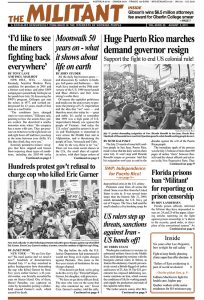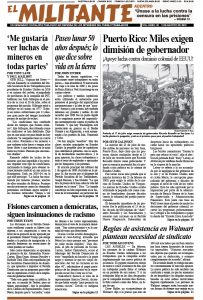Washington continues to increase its substantial military forces in the Middle East, amid deepening tensions with the bourgeois clerical rulers in Tehran, as Iranian Revolutionary Guards provocatively seized a British-flagged oil tanker and its crew of 23, July 19. The U.S. government has imposed debilitating economic sanctions on Iran, which worsen the conditions of life for working people and cripple the production and trade of the capitalist rulers there.
The tanker seizure comes after British Royal Marines, stationed on the U.K.’s colony Gibraltar, stormed and commandeered a tanker carrying Iranian oil that London says was bound for Syria in violation of EU sanctions, and after a U.S. warship shot down an Iranian drone over the Strait of Hormuz. Washington sailed a flotilla of warships through the Strait the same day. The waterway is 20 miles wide and runs between Iran and Oman, a key passageway for oil shipments from Gulf countries to the Arabian Sea and beyond. The Iranian rulers have repeatedly threatened to shut down the channel.
Washington also announced July 19 it was sending 500 troops to Saudi Arabia, the first U.S. troop deployment there since Washington’s 2003 war against Iraq. The Saudi rulers are a key ally of the U.S. imperialists’ political and military maneuvering in the Middle East. With Washington’s backing, they are waging a brutal war in Yemen against Houthi forces backed by Tehran. The Houthis have stepped up missile attacks on oil pipelines and airports in Saudi Arabia.
The U.S. troop deployment to Saudi Arabia follows the dispatch of a squadron of B-52 bombers to Qatar and an aircraft carrier-led battle group to the region. This is on top of thousands of troops, warplanes, missiles and naval forces already deployed in the area.
Hours after the seizure of the British tanker, Washington repeated its calls for the governments of allied forces to join a planned U.S.-led naval operation to escort vessels in the Gulf.
‘U.S. hands off Iran!’
“The U.S. capitalist ruling families’ claim to wield military power to defend ‘freedom of navigation’ in the Gulf is a pretext to step up its threats on Iran,” Amy Husk, Socialist Workers Party candidate for governor of Kentucky, said July 23. “Their government defends the interests of the bosses against working people both at home and abroad. The SWP demands U.S. hands off Iran, get all U.S. troops and armaments out of the Middle East and end all sanctions on the people of Iran.”
Since pulling out of the 2015 Iran nuclear deal — signed by former President Barack Obama and the Iranian government, along with the rulers in Germany, France, the U.K., Russia and China — the administration of Donald Trump has intensified pressure on Tehran. Washington aims to force the capitalist rulers in Iran into negotiations to permanently halt development of a nuclear weapons program and to pull back from their involvement in numerous conflicts unfolding across the Middle East, from Syria to Iraq to Yemen and the Gaza Strip.
Washington’s imperial arsenal
Washington, of course, defends unconditionally its imperial right to a vast nuclear arsenal. And the U.S. rulers are the only ones to ever use nuclear weapons, killing hundreds of thousands of civilians in Hiroshima and Nagasaki.
The U.S. rulers have imposed ever more stringent sanctions since November to drive Tehran’s oil exports to zero, aiming to force the Iranian government into talks. But the steps also increase the risk of military confrontation that neither ruling class really wants.
The impact of the sanctions fall hardest on Iranian working people, who face shortages of medicine, high unemployment and skyrocketing inflation. A growing number of workers from Iran, mostly Kurds, now cross the border to seek work in construction and other jobs in the Kurdish region of Iraq, where there are jobs and wages are higher, reported the Kurdish news agency Rudaw.
The steep drop in Iran’s oil exports also increases tensions within the different factions of the ruling clerical regime, as they look for ways to counter Washington’s squeeze. These political divisions, and the far-reaching independent operations of the Revolutionary Guard, add to the danger of unintended conflict.
The rulers in Tehran are determined not to relinquish the political and military sway they have established and their enhanced ability to threaten Israel.
They aim to maintain and extend beyond Iran’s borders the nearly four-decade-old political, clerical counterrevolution that pushed back the workers, farmers, oppressed nationalities and women who carried out the historic revolution that overthrew the hated shah there in 1979.

